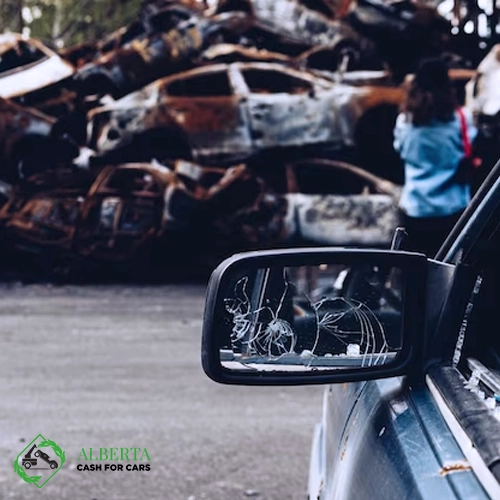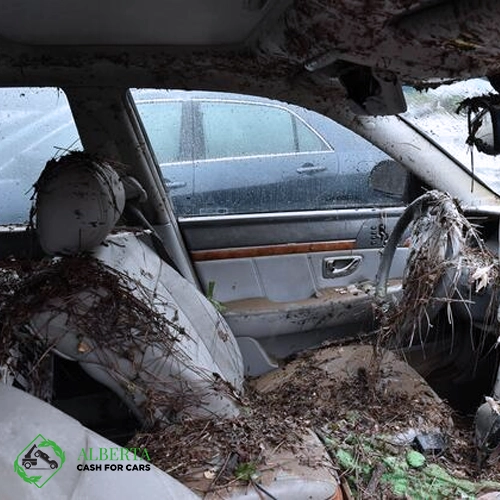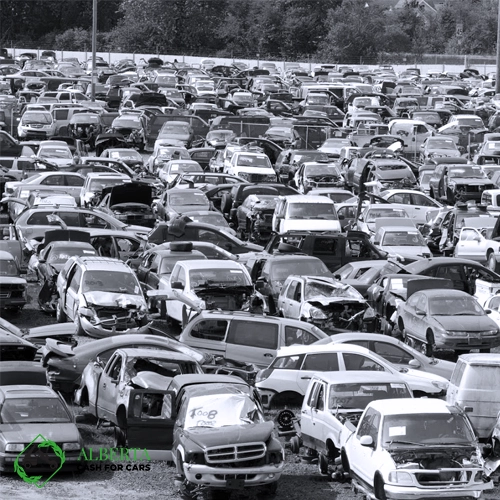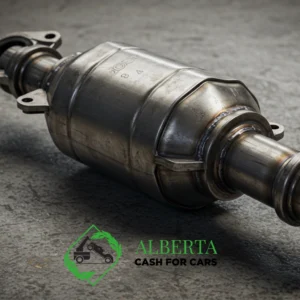The automobile industry is essential to our lives today. Many cars become obsolete or are irreparably destroyed when new versions with more features and higher efficiency are introduced. However, salvageable components and materials remain valuable in these retired cars. This is where auto salvage comes in. Automobile salvage recovers and recycles parts from abandoned or damaged cars. This blog will explore auto salvage, including its importance, environmental benefits, and contribution to the automotive industry.
What is Auto Salvage?
A salvage car is a vehicle that has been withdrawn, damaged, or shattered and is now available for salvage yards or people to purchase for parts or repairs. These salvaged cars have typically sustained significant damage due to accidents, natural disasters, or mechanical failure, making them uneconomical to repair by traditional means. Salvage cars can vary in condition and extent of damage.
Some salvage cars may have relatively minor problems, such as a damaged body panel or nonfunctional parts, while others may have severe structural damage or mechanical failures. The availability of salvage cars can include a wide range of makes, models, and years, providing options for individuals looking for specific parts or project vehicles. It’s important to note that auto salvage cars typically come with salvage titles, indicating their status as damaged or retired vehicles.
Types of Salvageable Cars
There are several types of salvageable vehicles available in the auto salvage industry. These vehicles may include:
Collision Damaged Cars
These cars have been affected by accidents that severely damage their body structure. Vehicles in a collision may have damaged their frames, fenders, doors, or other structural components, but their mechanical and electrical systems may still be salvageable.
Flood-damaged cars
These are vehicles that have been flooded or affected by water damage. Flood-damaged vehicles may have water in the interior, electrical system problems, or corrosion.
Theft-Recovered Vehicles
These cars were stolen and retrieved by police or insurance companies. While stolen-recovered vehicles may have been damaged during the theft or recovery process, many parts may still be in good functioning order and salvageable.
Fire-damaged cars
These are vehicles that have been partially or extensively damaged by fire. Fire-damaged cars may have compromised electrical systems and extensive interior damage, but salvageable parts may still include undamaged mechanical components such as engines or transmissions.
Mechanical failure vehicles
These vehicles have experienced significant mechanical failures that render them inoperable or unsafe to drive. Salvageable parts from mechanically disabled vehicles may include functioning engines, transmissions, suspension components, or other mechanical systems.
Classic or vintage cars
Salvageable vehicles are not limited to modern automobiles. Classic or vintage cars deemed salvageable can provide valuable components for restoration projects or collectors seeking specific parts for their vehicles.
Read Also: Scrap Car vs Salvage Car
Role of Auto Salvage Yards
Car salvage yards play a vital role in the auto salvage industry. They serve as an important intermediary between vehicle owners wishing to dispose of their vehicles and individuals or companies needing salvageable parts or repairable vehicles. Here are some key functions of automobile salvage yards:
- Vehicle Acquisition
- Vehicle evaluation and appraisal
- Parts extraction and sale
- auto recycling
- Environmental compliance
- Local Economy and Job Creation
- Collaboration and Support
Auto salvage yards play a critical role in the car salvage industry by providing a centralized hub for salvageable parts, facilitating materials recycling, contributing to local economies, and supporting sustainable practices in the automotive sector.
Related Post:
+5 Tips For Using Auto Salvage Yards | Safety Considerations
The Importance of Auto Salvage
Automobile salvage is significant for several reasons, making it an important aspect of the automotive industry and sustainable resource management. Here are some key reasons that highlight the importance of automotive salvage:
Reduce waste and landfill impact
Car salvage helps minimize the amount of waste sent to landfills. Rather than discarding entire vehicles, salvage yards recover and reuse valuable parts, significantly reducing the environmental impact of automotive waste disposal.
Conservation of natural resources
Automobile salvage promotes the conservation of natural resources. Reusing salvage parts reduces the demand for new parts, reducing the need for raw material extraction, energy consumption, and manufacturing processes that can have a significant environmental impact.
Cost-effectiveness and affordability
Car salvage offers low-cost options for vehicle maintenance and replacement. Salvaged components are often available for a fraction of the price of new parts, making car maintenance more affordable for customers, repair shops, and small companies. Because of this cost, automobile ownership remains accessible to a broader spectrum of individuals.
Environmental benefits
The salvage and junk car industry has significant environmental benefits. Reusing components minimizes the need for new manufacturing processes, reducing energy consumption and greenhouse gas emissions. In addition, recovering materials from vehicles, such as steel, aluminum, and plastics, reduces the need to harvest and process these resources, further conserving natural resources.
Promoting the circular economy
car salvage contributes to the principles of the circular economy by extending the life cycle of vehicles and their components. Salvaging parts and materials create a closed-loop system where resources are reused, reducing waste generation and promoting a more sustainable and resource-efficient automotive industry.
Quality Used Auto Parts
At Auto Salvage, we recognize the importance of reliable and durable auto parts. Our commitment to providing quality used auto parts begins with a thorough inspection process. Each component in our inventory undergoes rigorous scrutiny to meet stringent quality standards, ensuring that our customers receive dependable and high-performance parts.
Our approach is not just about salvaging; it’s about offering affordable alternatives to new parts. Cash for cars Auto Salvage believes that quality doesn’t have to come at a steep price. Our budget-friendly solutions provide cost-effective options for vehicle repairs and restoration, making high-quality auto parts accessible to all.
Eco-Friendly Auto Recycling
Environmental responsibility lies at the core of Auto Salvage’s operations. We understand the impact retired vehicles can have on the environment, and we are dedicated to mitigating it through eco-friendly auto recycling practices. Our comprehensive recycling process ensures that end-of-life vehicles are dismantled and disposed of in an environmentally responsible manner.
Fluid disposal is a critical aspect of our recycling efforts. Auto Salvage adheres to strict protocols for the safe disposal of fluids such as oil, coolant, and transmission fluid. This commitment prevents harmful substances from entering the ecosystem, contributing to a cleaner and safer environment for all.
Expert Salvage Consultation
Navigating the world of salvage vehicles and auto parts can be complex. At Alberta Auto Salvage, our team comprises automotive experts who are passionate about sharing their knowledge with our customers. Our commitment to providing expert salvage consultation ensures that you receive personalized guidance to make informed decisions based on your unique needs.
Our knowledgeable staff is well-versed in the intricacies of salvage vehicles and parts, offering insights into compatibility, condition, and potential uses. This transparent approach empowers our customers to make choices that align with their goals, whether they are automotive enthusiasts, mechanics, or individuals seeking reliable replacement parts.
The Future of Auto Salvage
The future of auto salvage is poised for significant advancements and developments as the automotive industry continues to evolve and embrace sustainable practices. Here are some key aspects that represent the future of car salvage:
- Technological advancements
- Integration of green initiatives
- Collaboration with manufacturers and repair facilities
- Embrace electric and hybrid vehicles
- Online marketplaces and e-commerce
Overall, the future of car salvage will be characterized by technological advancements, green initiatives, collaboration with industry stakeholders, adaptation to electric vehicles, and integration of digital platforms. These developments will drive efficiency, sustainability, and accessibility in the car salvage industry, ensuring its continued relevance and contribution to the automotive sector.
Electric Vehicle Salvage: Navigating a New Frontier
The automotive landscape is rapidly changing with the increasing adoption of electric vehicles (EVs). This shift presents both challenges and opportunities for the auto salvage industry. EVs have unique components and systems that require specialized handling and recycling processes.
Battery Management: A Critical Challenge
One of the biggest challenges in EV salvage is the handling and recycling of lithium-ion batteries. These batteries contain hazardous materials and require specialized equipment and expertise to dismantle safely. Salvage yards are investing in training and infrastructure to handle EV batteries responsibly, including proper storage, transportation, and recycling.
Component Recovery: Specialized Expertise
EVs have different components compared to traditional internal combustion engine (ICE) vehicles. Electric motors, power electronics, and high-voltage wiring require specialized knowledge to salvage and repurpose. Salvage yards are developing expertise in identifying, testing, and recovering these components.
Software and Technology: A New Layer of Complexity
EVs rely heavily on software and electronic control systems. This adds another layer of complexity to the salvage process. Salvage yards are exploring ways to diagnose, reprogram, and repurpose these systems.
Recycling Infrastructure: Building a Sustainable Future
The growing volume of EV batteries and components requires a robust recycling infrastructure. Salvage yards are collaborating with recycling companies and manufacturers to develop efficient and sustainable recycling processes.
Opportunities for Innovation: New Business Models
The rise of EVs presents opportunities for innovation in the auto salvage industry. Salvage yards are exploring new business models, such as battery refurbishment, component remanufacturing, and EV-specific parts sales.
Safety Protocols: Handling High-Voltage Systems
EVs operate at high voltages, which pose significant safety risks. Salvage yards are implementing strict safety protocols and providing specialized training to their employees to handle these systems safely.
Collaboration and Standardization: Working Together
The EV salvage industry is still in its early stages, and collaboration and standardization are crucial. Salvage yards, manufacturers, and regulatory bodies are working together to develop best practices and standards for EV salvage and recycling.
What Is a Salvage-Title Vehicle?
When a vehicle has an accident and the damage is greater than a certain percentage of the car’s value, the insurance company decides that it will not be economically viable to repair the car. As a result, they issues a salvage or unwanted certificate for this car. This certificate means that the car cannot be driven, sold or registered in its current condition.
In this situation, the insurance company will sell the car to a repair or parts sales center. If the car can be repaired, a new title will be issued and the car must pass an initial safety inspection. In this case, the future owners will realize that this car has been saved or restored.
Three important obstacles for salvageable cars: financing, insurance and resale
Salvageable cars face problems in getting a car loan, car insurance and car resale:
- The first problem is that you may not be able to get your loan. Banks and credit unions shy away from providing auto loans for salvageable cars because they are concerned that the vehicles will have poor structural integrity due to damage and may no longer be usable. Another thing is that these cars can need a lot of repairs and the borrower cannot pay for those repairs, thus increasing the risk of re-ownership. Banks are looking to provide money for a car that will last for the duration of the loan, whereas salvageable cars usually don’t have a long lifespan.
- The second problem that arises is that you have to make a lot of effort to get your car insurance. Usually, in terms of insurance, insuring cars under the title of salvage is a risky business. Because these cars are not healthy enough and the possibility of them breaking down in accidents is very high.
The third problem is that you will have fewer options when trading and reselling. Usually, buyers do not choose salvaged vehicles or pay a lot of money for them. In fact, it is difficult to determine the value of a vehicle with these conditions.
Finally, keep in mind that when selling a salvageable cars, do not hide the fact that your vehicle has a salvage title, as this is a huge fraud. The buyer of your car will eventually realize this fact when you hand over the title or receive the vehicle history report.
Who is auto salvage Alberta best for?
In general, car recycling can be a beneficial solution for anyone who is involved with their car, whether you are thinking of donating it to charity or selling it to a junkyard.
This work greatly helps to reduce the impact of vehicles on the environment and leads to savings in the cost of purchasing replacement parts for many people. Also, auto salvage Alberta plays a big role in the global automotive industry, and in the end, with this work, the amount of energy required It decreases to create new goods and materials, especially steel.
It’s true that saving an item may have many benefits for the environment, but it’s not always as beneficial as you might think. Many different factors play a role in people’s benefit from saving their car by auto salvage Alberta. These include:
- Year of manufacture and model of the car
- Current vehicle status
- Does the vehicle work or not?
- The amount of demand for its parts
- Price of scrap
No Hassle, Just Cash — Book Your Free Pickup or Quote Today!
Ok, so should I use auto salvage Alberta or not?
If you’re looking to get rid of a fully functional vehicle, selling it to a junkyard isn’t much fun. If you have a car that costs more to repair than the car is worth, salvage is probably the easiest and best way to get money from your car.
In general, if your car is more than 10 years old, the cost of repairing it is more than its value, and it is a good candidate for going to the salvage yard.
Conclusion
Auto salvage provides a sustainable solution for reusing old or damaged vehicles, benefiting the environment and the economy. Recovering valuable parts and materials reduces waste, conserves resources, and reduces pollution. In addition, automobile salvage provides affordable alternatives to costly new parts, making vehicle maintenance and repair more accessible to consumers. As we move toward a greener future, the car salvage industry is poised to play an even greater role through technological advancements and increased collaboration. By embracing salvage, we can give new life to old vehicles while positively impacting our planet and our communities.













